The AnandTech Coffee Lake Review: Initial Numbers on the Core i7-8700K and Core i5-8400
by Ian Cutress on October 5, 2017 9:00 AM EST- Posted in
- CPUs
- Intel
- Core i5
- Core i7
- Core i3
- 14nm
- Coffee Lake
- 14++
- Hex-Core
- Hyperthreading
Benchmarking Performance: CPU Encoding Tests
One of the interesting elements on modern processors is encoding performance. This includes encryption/decryption, as well as video transcoding from one video format to another. In the encrypt/decrypt scenario, this remains pertinent to on-the-fly encryption of sensitive data - a process by which more modern devices are leaning to for software security. Video transcoding as a tool to adjust the quality, file size and resolution of a video file has boomed in recent years, such as providing the optimum video for devices before consumption, or for game streamers who are wanting to upload the output from their video camera in real-time. As we move into live 3D video, this task will only get more strenuous, and it turns out that the performance of certain algorithms is a function of the input/output of the content.
All of our benchmark results can also be found in our benchmark engine, Bench.
7-Zip 9.2: link
One of the freeware compression tools that offers good scaling performance between processors is 7-Zip. It runs under an open-source licence, is fast, and easy to use tool for power users. We run the benchmark mode via the command line for four loops and take the output score.
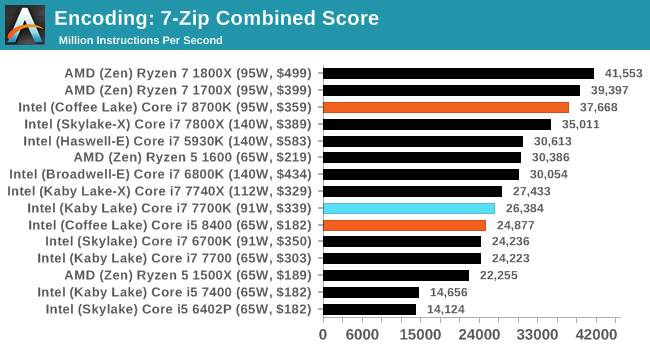
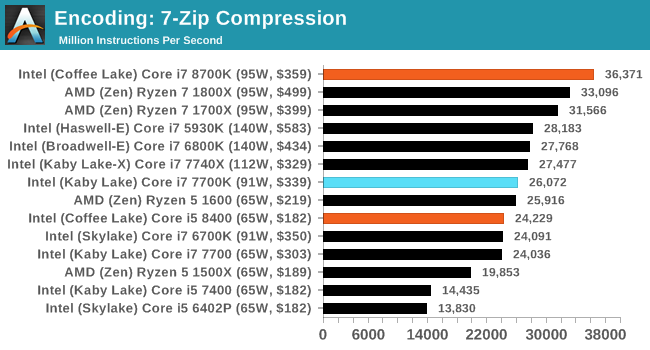
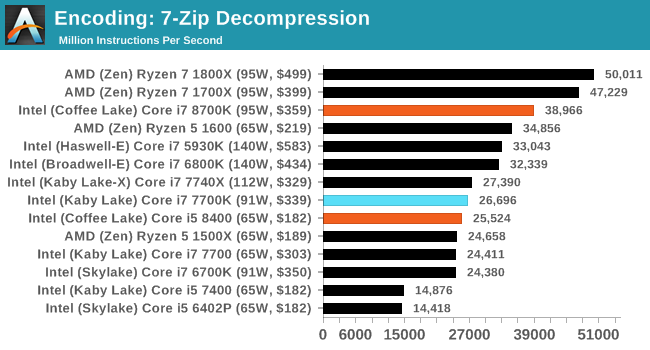
WinRAR 5.40: link
For the 2017 test suite, we move to the latest version of WinRAR in our compression test. WinRAR in some quarters is more user friendly that 7-Zip, hence its inclusion. Rather than use a benchmark mode as we did with 7-Zip, here we take a set of files representative of a generic stack (33 video files in 1.37 GB, 2834 smaller website files in 370 folders in 150 MB) of compressible and incompressible formats. The results shown are the time taken to encode the file. Due to DRAM caching, we run the test 10 times and take the average of the last five runs when the benchmark is in a steady state.
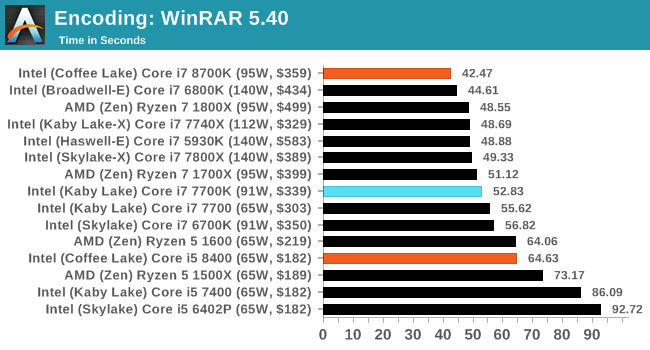
AES Encoding
Algorithms using AES coding have spread far and wide as a ubiquitous tool for encryption. Again, this is another CPU limited test, and modern CPUs have special AES pathways to accelerate their performance. We often see scaling in both frequency and cores with this benchmark. We use the latest version of TrueCrypt and run its benchmark mode over 1GB of in-DRAM data. Results shown are the GB/s average of encryption and decryption.
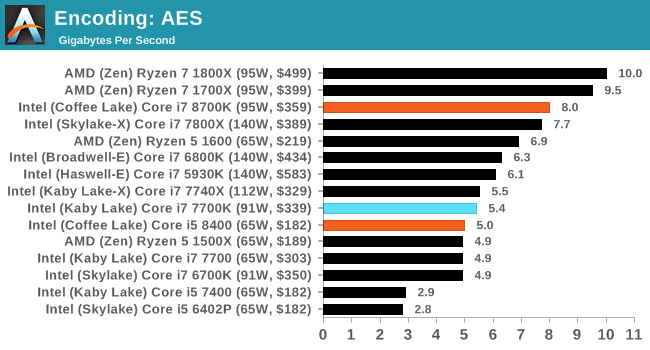
HandBrake v1.0.2 H264 and HEVC: link
As mentioned above, video transcoding (both encode and decode) is a hot topic in performance metrics as more and more content is being created. First consideration is the standard in which the video is encoded, which can be lossless or lossy, trade performance for file-size, trade quality for file-size, or all of the above can increase encoding rates to help accelerate decoding rates. Alongside Google's favorite codec, VP9, there are two others that are taking hold: H264, the older codec, is practically everywhere and is designed to be optimized for 1080p video, and HEVC (or H265) that is aimed to provide the same quality as H264 but at a lower file-size (or better quality for the same size). HEVC is important as 4K is streamed over the air, meaning less bits need to be transferred for the same quality content.
Handbrake is a favored tool for transcoding, and so our test regime takes care of three areas.
Low Quality/Resolution H264: Here we transcode a 640x266 H264 rip of a 2 hour film, and change the encoding from Main profile to High profile, using the very-fast preset.
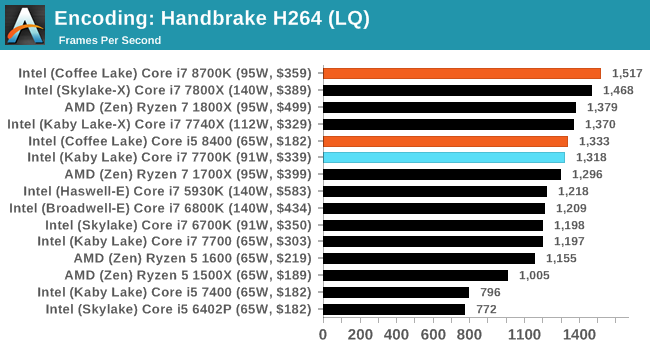
High Quality/Resolution H264: A similar test, but this time we take a ten-minute double 4K (3840x4320) file running at 60 Hz and transcode from Main to High, using the very-fast preset.
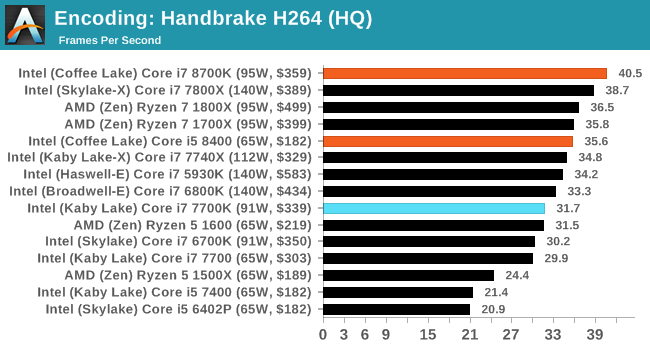
HEVC Test: Using the same video in HQ, we change the resolution and codec of the original video from 4K60 in H264 into 4K60 HEVC.
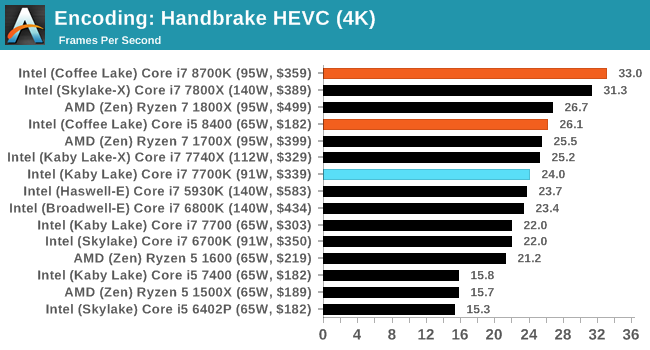










222 Comments
View All Comments
masouth - Tuesday, October 10, 2017 - link
lol, he makes a comment on how SOFTWARE is written and you can't jump off YOUR bandwagon (be it Intel or Neutral) quick enough to heap your scorn.Dolpiz - Saturday, October 14, 2017 - link
https://youtu.be/oCSkyNHXIAE?t=20m48squanticchaos - Monday, February 5, 2018 - link
If you consider Ryzen does not have integrated graphics, Coffee lake beats its TDP hands down.Crono - Thursday, October 5, 2017 - link
I love the smell of coffee In The MorningIGTrading - Thursday, October 5, 2017 - link
We know that this is a "short" "pre-review", but it is a bit bizarre that there is no mention of AMD in the conclusion.Not that we consider that AMD should be necessarily mentioned in an article dedicated to an Intel launch, BUT Intel's offerings were always discussed in the conclusion section of every AMD review.
So we would consider it's just fair to remind people in the conclusion as well that the new Coffee Lake chips from Intel are a welcomed addition, but that they are unable to completely dethrone the competition and should be praised for the fact that AMD will be now forced to lower the Ryzen prices a bit.
The way it is right now, the conclusion is written like Intel is the only alternative, quad or hexa core, with nothing else on the market.
Personal opinion :
Despite me being the technical consultant on the team, this was observed by two of my colleagues (financial consultants) and they even brushed it away themselves as "nitpicking" .
Since I've worked in online media myself, this looks very similar with an attempt to post something to "play nice" with Intel's PR so we've decided to post this comment.
Therefore we eagerly await Ian's full review, with his widely appreciated comprehensive testing and comparisons.
Nevertheless, thank you Ian for your work! It is appreciated.
eddieobscurant - Thursday, October 5, 2017 - link
What did you expect, Anandtech is an intel pro review site. They didn't even mention the huge price difference between intel's z370 chipset motherboards required for coffee lake in contrast to amd's b350 chipset motherboards. It's almost double price.RDaneel - Thursday, October 5, 2017 - link
I haven't been following this closely, but does that mean that b350 boards are about $60? That's incredible! The Z370 I'm looking at is only $120, which didn't seem that bad, but if the b350s are really $60-70, then it might be worth checking out. Are they really that cheap?kpb321 - Thursday, October 5, 2017 - link
Yup. Newegg shows almost a dozen B350 boards for $60-$70 currently. Most are micro ATX but there are a couple ATX boards in that range currently (after rebate) including "gaming" boards like the MSI B350 TOMAHAWK.name99 - Thursday, October 5, 2017 - link
Really? Other times I've heard they are a pro Apple review site, a pro IBM review site, and a pro MS review site.They really seem remarkably catholic in whom they support.
seamonkey79 - Friday, October 6, 2017 - link
It depends on the article.